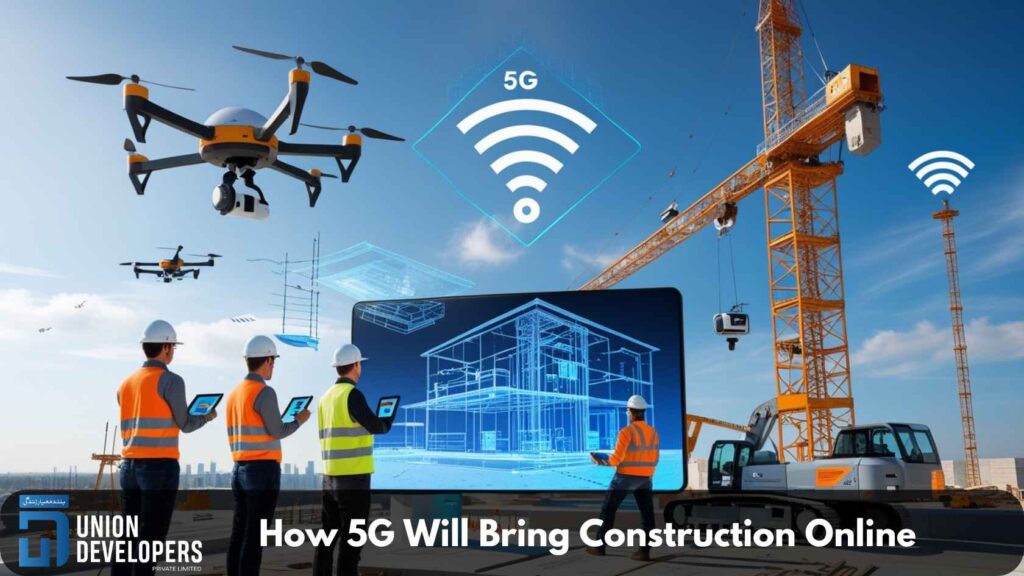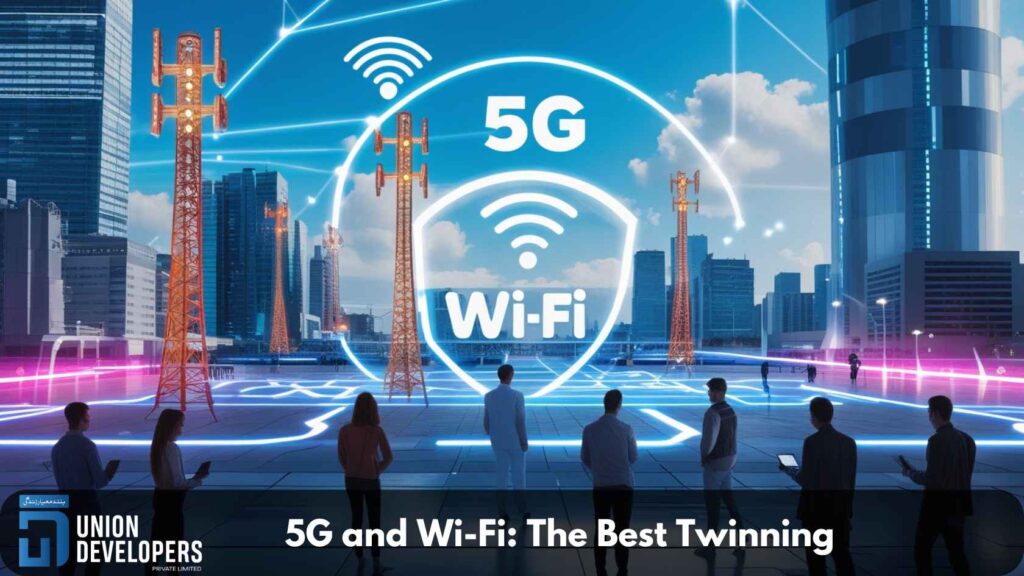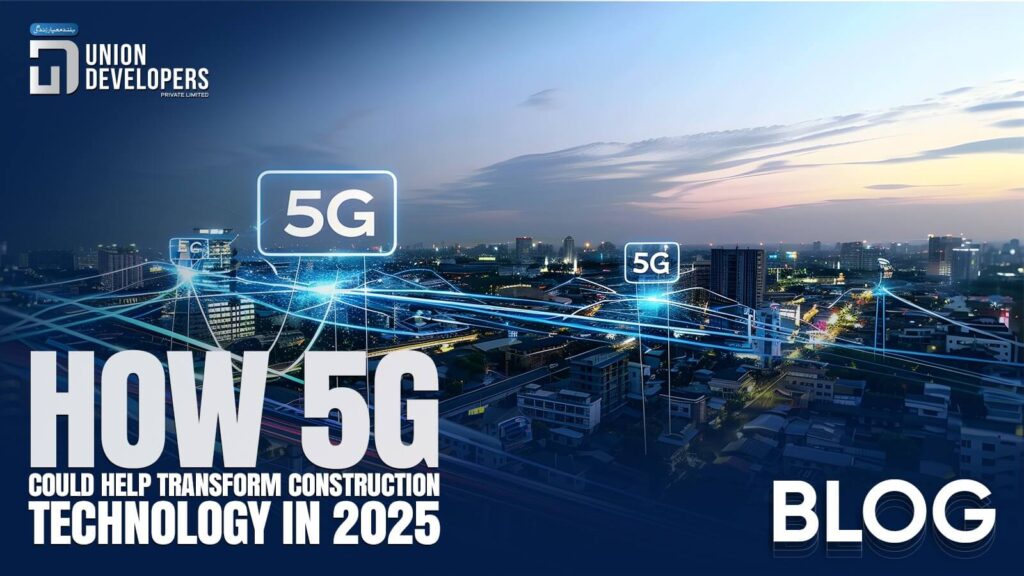As new technology has paved its way in the construction industry, it is crucial for the constructors and developers to upgrade their digital adoption to stay ahead of the curve. However, the inconsistent connectivity and lack of standardisation become hindrances in overall digital transformation and affect the construction industry as well. This is where the 5G rollout will enhance the efficiency of technology in construction in 2025. In this write-up, we will explore how 5G can transform construction technology and why it is important for digital strategy.
5G Technology in Construction
5G is the holistic term for a new upgraded generation of wireless technologies that will surpass the current tech infrastructures worldwide. The enhanced wireless broadband speeds and the connection capabilities to IoT devices will digitise the construction industry in Pakistan. 5G will mitigate the drop or lag in connectivity and network speed and will create a productive and efficient work environment.
Challenges in the Construction Industry
Both temporary and dynamic in nature, the construction building sites tend to lack the ICT infrastructure to leverage digital technologies. To monitor complex and large construction sites, high-resolution cameras are needed, supported by a high-capacity network connection.

5G is the Solution
Now, the world is advancing, so the connectivity networks are also due to the newly deployed standalone 5G networks and edge computing capacity. It will support the construction sites in connecting the robots that can scan the site in 3D, CCTV footage cameras, drones, and headsets for augmented reality services.
Singapore Trail of 5G implementation
Singtel deployed the standalone 5G network and edge computing capacity to support the Gammon construction site in Singapore.
Gammon estimated that 5G-connected robots to scan construction sites led to a 30% to 40% improvement rate in productivity for the construction process.
Also, the 5G-connected CCTV cameras will improve safety from any hazards by enabling image recognition systems. They are also planning to deploy these solutions on their other construction sites as well, which shows the effectiveness of the idea.
Wider Implications of 5G Connectivity
5G connectivity can also enable contractors to create up-to-date and detailed digital models of the building site. These models can be used to manage the assets and equipment, verify the quality of the work, monitor progress and ensure compliance with environmental and safety measures. On account of this, the construction sector can achieve a major jump in both productivity and safety while amplifying customer satisfaction.
How 5G Will Bring Construction Online
Many companies wonder, as robots have transformed manufacturing if they can also do the same for the construction sector. Well, it is very possible to improve and augment construction site productivity with 5G. 5G can solve the problems of lagging or connection drop by enabling high-speed connectivity for automated construction site processes.

The Singapore trail focused on four major use cases with the latest construction technology in Sentosa Island. 5G-connected CCTV for better live video streams connected with AI to detect safety violations and any serious hazards.
Next, the drone inspection connected with 5G to inspect hard-to-reach areas, reducing the expensive equipment and improving efficiency. Also, the 5G enables the 3D models to overlay onto the actual construction sites. This helps to identify potential issues early. Additionally, if you are looking for the best construction services in Pakistan, then look no further than Union Developers. Their customer experience is exemplary by providing the best-optimised construction services.
Benefits of the 5G connectivity
Real-time monitoring and hazard detection enhance the safety of the workers on site. Streamlined processes and automation will lead to faster construction timelines. This advancement in construction technology helps to reduce manual labour and optimise the workflows for project efficiency.
Accurate visualisation and real-time data cater to better quality control throughout the project construction. This trial indicated the potential of 5G technology in construction sites to completely blow the construction industry away by improving its productivity, safety and efficiency.
5G and Wi-Fi: The Best Twinning
If the construction industry in Pakistan wants to truly embrace the digital future, the adoption of 5G is crucial. With the best combination of Wi-Fi 6 and 5G, construction companies can achieve unbeatable connectivity. Wi-Fi 6 gives super-fast speeds within structures, while 5G supercharges outdoor environments.

Moreover, the synchronised deployment provides a consistently high speed of connection despite the staff location and across extensive construction sites. This synchronisation boosts workflow efficiency, resulting in reduced costs and shorter projects. It also helps to decrease carbon emissions due to decreased energy expenditure during the construction project.
Catering data-driven industry
The construction industry of Pakistan embraces advanced technology and a more precision-led and data-driven framework. There is a growing demand for technology in construction that enhances accuracy, efficiency, and risk reduction.
5G gives way to a wide array of high-performance digital options for the construction industry. It is empowering the construction sector to optimise the building process and also power up the data-hungry applications that have become essential for modern construction sites. Moreover, the improved data and real-time market updates have overcome the limitations due to unreliable broadband speeds.
Drones
Drones are a very important part of the construction industry. They are used for the tracking of the construction sites and assessing the progress of the work. These drones have HD cameras and complex sensors that require stable and speedy New York. So, combining 5G and cloud computing for drone work improves the abilities.
Also, drones can gather data on their own and send it in real-time to the supervisors off-site. Compliance and collaboration are abided by the data’s ability to identify problems at a breakneck speed, such as heat-sensitive cameras that get water damage or fractures.
Conclusion
The construction industry has undergone a commendable digital transformation, embracing technologies that enhance productivity, efficiency and safety. However, these technologies can only be used efficiently if the connectivity issues are resolved. Hence, the 5G network is the optimal advancement for the construction industry in Pakistan. 5G with Wi-Fi 6 can help the construction industry to overcome the challenges that hinder productivity. Lastly, 5G will be expanded into more use cases worldwide, showcasing outstanding positive results in the construction sector.









